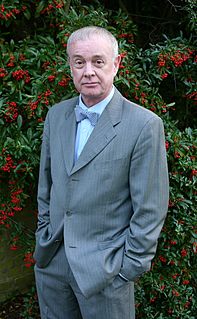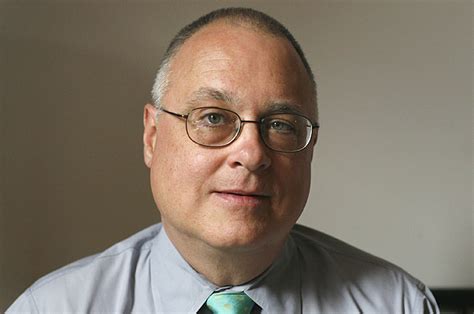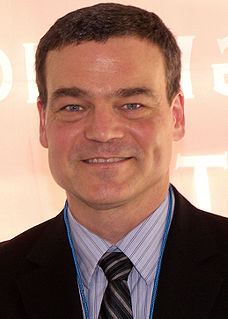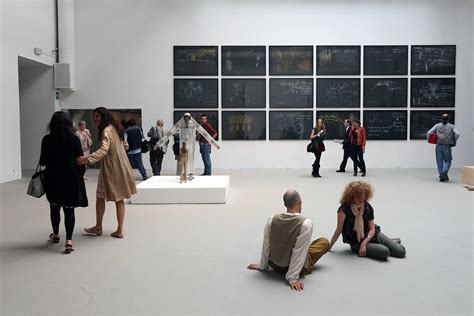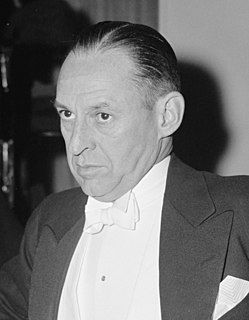Top 1200 Wealth Quotes & Sayings - Page 6
Explore popular Wealth quotes.
Last updated on December 25, 2024.
[Barack] Obama, for example, he has not given up on cap-and-trade. Now, he has not been able to pass cap-and-trade, but cap-and-trade is all about redistribution of wealth in a global basis - taking money out of this country and giving it to third-world countries on the other end of the ocean. And that is redistribution of wealth in a global basis. It's fundamental Marxism.
Segregations, by which I mean people living in a certain area, was a planned system. It was made that way. And what you have is a system in which people are there to be exploited. They're right there waiting for it. A community of people who've been denied wealth, denied wealth-building opportunities, are right there. And the banks went right after them.
The sum of all that makes a just man happy
Consists in the well choosing of his wife:
And there, well to discharge it, does require
Equality of years, of birth, of fortune;
For beauty being poor, and not cried up
By birth or wealth, can truly mix with neither.
And wealth, when there's such difference in years,
And fair descent, must make the yoke uneasy.
Angus Deaton has written a wonderful book, The Great Escape: Health, Wealth, and the Origins of Inequality. . . . Deaton's book is a magisterial overview of health, income, and wealth from the industrial revolution to the present, taking in countries poor and rich. Not just jargon-free but equation-free, the book is written with a beautifully lucid style. . . . [P]owerfully argued and convincing.
Neither numbers nor powers nor wealth nor learning nor eloquence nor anything else will prevail, but purity, living the life, in one word, anubhuti, realisation. Let there be a dozen such lion-souls in each country, lions who have broken their own bonds, who have touched the Infinite, whose whole soul is gone to Brahman, who care neither for wealth nor power nor fame, and these will be enough to shake the world.
The rich does not work for money, but money work for them...., While the poor work for money.Illiteracy, both in word and numbers, is the foundation of financial struggle....,Wealth is a person's ability to survive so many number of days forward... or if i stopped working today, how could i survive?...,Wealth is the measure of cash flow from to asset column compared with the expense column.
I regard large inherited wealth as a misfortune, which merely serves to dull men's faculties. A man who possesses great wealth should, therefore, allow only a small portion to descend to his relatives. Even if he has children, I consider it a mistake to hand over to them considerable sums of money beyond what is necessary for their education. To do so merely encourages laziness and impedes the healthy development of the individual's capacity to make an independent position for himself.
When Jesus warns us not to store up treasures on earth, it's not just because wealth might be lost; it's because wealth will always be lost. Either it leaves us while we live, or we leave it when we die. No exceptions....Realizing its value is temporary should radically affect our investment strategy.... According to Jesus, storing up earthly treasures isn't simply wrong. It's just plain stupid.
We are free today substantially, but the day will come when our Republic will be an impossibility. It will be an impossibility because wealth will be concentrated in the hands of a few. A Republic cannot stand upon bayonets, and when the day comes when the wealth of the nation will be in the hands of a few, then we must rely upon the wisdom of the best elements in the country to readjust the laws of the nations to the changed conditions.
Even if the wealth and power be well distributed throughout a community, its members will not be happy unless they are inwardly so, and obviously where the distribution is bad, where the few have a vast superfluity and the many are consumed by anxiety or want, or where a few controllers can exercise their will over the many, society has failed, even though its total wealth and power be increased.
The man of wealth [should] consider all surplus revenues which come to him simply as trust funds, which he is called upon to administer to produce the most beneficial results for the community - the man of wealth thus becoming the mere trustee and agent for his poorer brethren, bringing to their service his superior wisdom, experience and ability to administer, doing for them better than that they would or could do for themselves.
If a man loses a dear friend, he looks around and sees many friends come to console and comfort him. If a man loses his wealth, after a little thought he will realize that the delight that came from wealth will be restored by finding more. Thus he forgets his loss and is consoled. But if a man's heart is deprived of peace, where will he find it again, how will he replace it?
We see that there are two different kinds of...societies: (a) parasitic societies and (b) producing societies. The former are those which live from hunting, fishing, or merely gleaning. By their economic activities they do not increase, but rather decrease, the amount of wealth in the world. The second kind of societies, producing societies, live by agricultural and pastoral activities. By these activities they seek to increase the amount of wealth in the world.
We find all the no-life-support-wealth-producing people going to their 1980s jobs in their cars and buses, spending trillions of dollars' worth of petroleum daily to get to their no-wealth-producing jobs. It doesn't take a computer to tell you that it will save both Universe and humanity trillions of dollars a day to pay them handsomely to stay at home.
It is not much different from a person who goes to the gym to exercise on a regular basis versus someone who sits on the couch watching television. Proper physical exercise increases your chances of health, and proper mental exercise increases your chances for wealth. Laziness decreases both health and wealth.
Under the old social philosophy which had governed the Middle Ages, temporal, and therefore all economic, activities were referred to an eternal standard. The production of wealth, it distribution and exchange were regulated with a view to securing the Christian life of Christian men. In two points especially was this felt: First in securing the independence of the family, which can only be done by the wide distribution of property, in others words the prevention of the growth of a proletariat; secondly, in the close connection between wealth and public function.
The form of law which I propose would be as follows: In a state which is desirous of being saved from the greatest of all plagues-not faction, but rather distraction-there should exist among the citizens neither extreme poverty nor, again, excessive wealth, for both are productive of great evil . . . Now the legislator should determine what is to be the limit of poverty or of wealth.
If we understand the dangers of materialism, it will help liberate us to experience the joys of Christ-centered stewardship. Jesus speaks of the "deceitfulness of wealth" . The psalmist warns, "Though your riches increase, do not set your heart on them" . The dangers of materialism are far-reaching. We should not think that we're immune to the value-changing nature of wealth.
A rentier is an investor whose relationship to a company or enterprise is strictly limited to the ownership of financial wealth (such as stocks or bonds) and the receipt of income on that wealth (such as dividends or interest). The financial system performs dismally at its advertised task, that of efficiently directing society's savings towards their optimal investment pursuits. The system is stupefyingly expensive, gives terrible signals for the allocation of capital, and has surprisingly little to do with real investment.
In the late 1980s, Soviets were allowed to keep the wealth they created by raising vegetables on their garden plots. Although these plots composed only about 2% of the agricultural lands in the Soviet Union, they produced 25% of the food! When Soviets kept the wealth they created, they produced almost 16 times more than when it was taken from them at gunpoint, if necessary!
This is not to say that the government should confiscate from the "haves" and bestow upon the "have-nots", beyond the requirements of a compassionate welfare program to provide for those who cannot provide for themselves. Far from it. But it is to say that our duty is to foster a strong, vibrant wealth-producing economy which operates in such a way that new additions to wealth accrue to those who presently have little or no ownership stake in their country.
Vladimir Putin is the wealthiest man on the planet, for sure. But this is different to the wealth of a Bill Gates or a Warren Buffett, a Carlos Slim or a Sergey Brin. They stay wealthy whether it is Barack Obama or Donald Trump in power. Putin's wealth depends on him staying in power. It is all about controlling the budget, the hard currency reserves and keeping under his thumb the oligarchs who cannot move their money without his permission. It is something close to a trillion dollars that he can control and move.
How strange and foolish is man. He looses his health in gaining wealth. Then to regain health he wastes his wealth. He ruins is present while worrying about his future - but weeps in the future by recalling his past. He lives as though death shall never come to him - but dies in a way as if he were never born.
At the beginning of this marvelous era it was natural to expect, and it was expected, that laborsaving inventions would lighten the toil and improve the condition of the laborer; that the enormous increase in the power of producing wealth would make real poverty a thing of the past... From Progress and Poverty, To those who, seeing the vice and misery that spring from the unequal distribution of wealth and privilege, feel the possibility of a higher social state and would strive for its attainment.
But though a funded debt is not in the first instance, an absolute increase of Capital, or an augmentation of real wealth; yet by serving as a New power in the operation of industry, it has within certain bounds a tendency to increase the real wealth of a Community, in like manner as money borrowed by a thrifty farmer, to be laid out in the improvement of his farm may, in the end, add to his Stock of real riches.
Tax time approaches, and Americans are as always paying H & R Block billions to help them save some of their wealth from their ravenous government. Pitiful, in a way: it underlines the grim but
unacknowledged fact that the government is their enemy and they have to hire protection from it. But don't we enjoy 'self-government'? Well, if we have it, I'd hardly say we enjoy it. True, we aren't being taxed by the monarch of Great Britain, but our American-born rulers claim far more of our wealth than the British monarchs ever did.
Man's ignorance of the Law of Love in personal and world relationships will not serve as an excuse to save him from disaster. Wealth cannot be acquired from others by might, for wealth thus taken will impoverish him who takes anything which is not given. Nor can power be thus acquired, for the weakness of the despoiled will prevail against the might of the despoiler.
I think that a true economics thinker or a Marxist thinker would make nonsense of my argument, although I have given massive seminars and no one has demolished it so far. I did think that this idea from an artisanal and trading perception of the auratic quality of goods when they are given character and inscription, made the stories of phantasmic wealth read more powerfully in the 18th and 19th centuries than the stories of Cinderella's wealth, because they are conjured out of nothing by these magic means.
Inequalities of wealth, unjustly established, have assuredly injured the nation in which they exist during their establishment; and, unjustly directed, they injure it yet more during their existence. But inequalities of wealth justly established, benefit the nation in the course of their establishment; and, nobly used, aid it yet more by their existence.
The information revolution has changed people's perception of wealth. We originally said that land was wealth. Then we thought it was industrial production. Now we realize it's intellectual capital. The market is showing us that intellectual capital is far more important that money. This is a major change in the way the world works. the same thing that happened to the farmers during the Industrial Revolution is now happening to people in industry as we move into the information age.
Every time man makes a new experiment he always learns more. He cannot learn less. He may learn that what he thought was true was not true. By the elimination of a false premise, his basic capital wealth which in his given lifetime is disembarrassed of further preoccupation with considerations of how to employ a worthless time-consuming hypothesis. Freeing his time for its more effective exploratory investment is to give man increased wealth.
But the most dangerous Hypocrite in a Common-Wealth, is one who leaves the Gospel for the sake of the Law: A Man compounded of Law and Gospel, is able to cheat a whole Country with his Religion, and then destroy them under Colour of Law: And here the Clergy are in great Danger of being deceiv'd, and the People of being deceiv'd by the Clergy, until the Monster arrives to such Power and Wealth, that he is out of the reach of both, and can oppress the People without their own blind Assistance.
Our culture is hung up on and overemphasises what can be derived from material objects. I think this is something quite new, over the past 200 or 300 years - that life has become about accumulating material wealth. The 21st century is not about accumulating material wealth like the 20th century. It's already eroding.
In every age, people are certain that only the things they have deemed valuable have true value. The search for love and the search for wealth are always the two best stories. But while a love story is timeless, the story of a quest for wealth, given enough time, will always seem like the vain pursuit of a mirage.
Since the government creates no wealth, it can only transfer the wealth required to hire people. Even if the government creates a million jobs, that is not a net increase in jobs, when the money that pays for those jobs is taken from the private sector, which loses that much ability to create private jobs.
Love, when it came and knocked on my door, was going to be enough. And that unknown author who'd written that if you had fame, it was not enough, and if you had wealth as well, it was still not enough, and if you had fame, wealth, and also love ... still it was not enough - boy, did I feel sorry for him.
As mass production has to be accompanied by mass consumption, mass consumption, in turn, implies a distribution of wealth ... to provide men with buying power. ... Instead of achieving that kind of distribution, a giant suction pump had by 1929-30 drawn into a few hands an increasing portion of currently produced wealth. ... The other fellows could stay in the game only by borrowing. When their credit ran out, the game stopped.
It is this idea 'decency' should be attached to wealth -and 'indecency'' to poverty - that forms the core of one strand of skeptical complaint against the modern status-ideal. Why should failure to make money be taken as a sign of an unconditionally flawed human being rather than of a fiasco in one particular area if the far larger, more multifaceted, project of leading a good life? Why should both wealth and poverty be read as the predominant guides to an individual's morals ?
Power from any source tends to create an appetite for additional power. It was almost inevitable that the super-rich would one day aspire to control not only their own wealth, but the wealth of the whole world. To achieve this, they were perfectly willing to feed the ambitions of the power-hungry political conspirators who were committed to the overthrow of all existing governments and the establishment of a central worldwide dictatorship.
One percent of the nation owns a third of the wealth. The rest of the wealth is distributed in such a way as to turn those in the 99 percent against one another: small property owners against the propertyless, black against white, native-born against foreign-born, intellectuals and professionals against the uneducated and the unskilled. These groups have resented one another and warred against one another with such vehemence and violence as to obscure their common position as sharers of leftovers in a very wealthy country.
Lenin is said to have declared that the best way to destroy the Capitalist System was to debauch the currency. By a continuing process of inflation, governments can confiscate, secretly and unobserved, an important part of the wealth of their citizens. By this method they not only confiscate, but they confiscate arbitrarily; and, while the process impoverishes many, it actually enriches some. The sight of this arbitrary rearrangement of riches strikes not only at security, but at confidence in the equity of the existing distribution of wealth.
All of the great ideas, without action, become stale and useless. The key to turning dreams into reality is action. People who have great ideas are a dime a dozen. People who act on their dreams and ideas are the select few, but they are the ones who gain the wealth, wealth and wisdom that is available. Someone will act today. Let it be you.
The nature of women's oppression is unique: women are oppressed as women, regardless of class or race; some women have access to significant wealth, but that wealth does not signify power; women are to be found everywhere, but own or control no appreciable territory; women live with those who oppress them, sleep with them, have their children - we are tangled, hopelessly it seems, in the gut of the machinery and way of life which is ruinous to us.
What I know for sure is that it's only when you make the process your goal that the big dream can follow. That doesn't necessarily mean your process will necessarily lead you to wealth or fame. In fact, your dream may have nothing to do with tangible prosperity and everything to do with creating a life filled with joy, one with no regrets and a clear conscience. I've learned that wealth is a tool that gives you choices, but it can't compensate for a life not fully lived and it certainly can't create a sense of peace within you.
It was with the Industrial Revolution, as society plunged ever more eagerly into the conquest of material riches and bent all its energies to the accumulation of goods, that material poverty became a major problem. Obviously, this meant abandonment or downgrading of spiritual values, virtue, etc. To share or not to share in the increase of the collective wealth-this was the Number One question. It was the desire to acquire wealth that prompted the poor to start fighting.
With all thy getting, get understanding, is the banner under which these Forbes editorials have appeared since the first issue of the publication. We have no illusions about what great wealth can do and what it cannot do. We believe in the worthwhileness of striving by all worthy means to attain success and to attain wealth. Simply because we are convinced that no amount of money is worth the sacrifice of one's better instincts, of one's self-respect-of one's soul, if you wish-simply because we are convinced that riches not gained legitimately and decently are not worth having.
Consider whether fulfillment of the goal you have chosen will constitute success. What is success? If you possess health and wealth, but have trouble with everybody (including yourself), yours is not a successful life. Existence becomes futile if you cannot find happiness. When wealth is lost, you have lost a little; when health is lost, you have lost something of more consequence; but when peace of mind is lost, you have lost the highest treasure.









